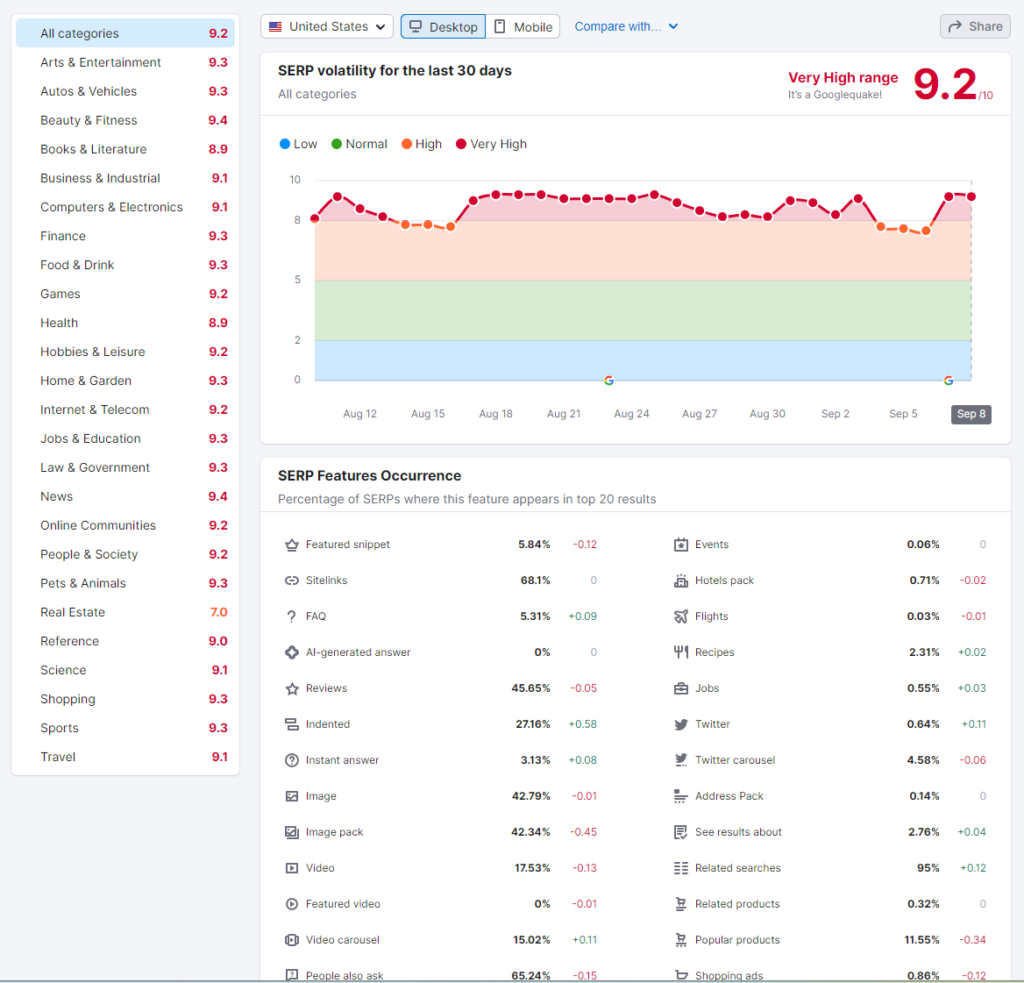
Google’s August 2023 Core Update
What?! Another core update from Google to deal with?
First things first; core updates from Google are a regular occurrence and anyone familiar with the world of SEO will also be familiar with these updates to Google’s search algorithms.
You can view a list of updates in recent years on the Google Search Status Dashboard. As you can see, there are typically several core updates each year along with other major updates to Google’s search algorithms and systems, such as the Helpful Content update, released last year.

So, a core update isn’t usually anything to panic about or a reason to make huge technical changes to your website if you’ve seen a dip in performance during its rollout.
Yes, you may see changes in the performance of your website on SERPs (Search Engine Results Pages) while the updates are being rolled out, but as long as you are continually creating helpful, reliable, and people-first content for your website, this should settle after a while.
What is a core update and why do I need to know when one is being rolled out?
Google is constantly updating their search algorithms and systems, but a few times a year they decide to make significant changes and roll out a larger update, which is why they are called core updates.
Because these core updates include bigger changes and take around two weeks to complete, they can affect search results for a period of time and some websites can see significant fluctuations in keyword and search term ranking (and potentially website traffic, too) as a result.
This is what we, in the SEO industry, call “SERP volatility”.
Here’s an example of the SERP volatility that we’ve seen during this latest core update.

If you’re unaware of a core update being rolled out, SERP volatility can be alarming. Suddenly, your search term and keyword ranking has plummeted and you have no idea why! Typically, there are several waves of SERP volatility with each core update and they can continue for a while after the rollout has completed.
The good news is that Google announces every core update on their Search Status Dashboard, but they also tend to announce them on social media too; they announced this latest one on X (Twitter) as soon as it went live.
Top tip: we highly recommend following Google Search Central on X and enabling notifications to help prevent any updates or changes catching you by surprise.
Why does Google release so many core updates?
Google has made it abundantly clear, many times over, that they want to present (and prioritise) helpful and reliable content in search results. These core updates are Google’s way of making sure their algorithm and systems continue to assess content appropriately in order to do this.
For example, websites may have previously appeared lower down on SERPs but now answer a user’s question or solve their problem better than those above them. Maybe information that the originally higher ranking websites contained, that was previously thought to be correct, turned out to be wrong. Maybe previously underperforming websites were discussing new ideas or methods that have since gained more popularity and are now considered “better” than the ones the higher ranking websites were discussing. Maybe the content of the higher ranking sites seemed helpful but actually didn’t really solve the user’s problems.
Google uses a great analogy of a “top 100 films” list to help illustrate how SERP rankings can change over time. A list of the best 100 movies ever made (according to the curators specific set of criteria) is created. Will that list remain definitive forevermore? Unlikely. Some films may not have aged well over time. Some may contain themes, terminology, or promote opinions that are no longer relevant or could even be potentially harmful. More recently released films may be more deserving of a place on the list. So, the list needs to be reassessed and refreshed periodically to ensure it is as accurate and up-to-date as possible. That doesn’t necessarily make the films that get moved down the list bad, just that others deserve a higher place.
Whatever the reason behind a change in SERP ranking, Google wants to ensure that the most relevant and helpful information is provided on the first page of search results. These updates help to ensure that – they are Google’s way of reassessing and refreshing their lists.
How do I prepare for a core update from Google?
In short… nothing.
That is to say, you shouldn’t need to do anything if you are continually producing helpful content that answers questions and solves problems that your target audience is searching on Google, i.e. helpful, people-first content.
What should I do after a core update from Google?
Again, the answer is the same as above. As long as you are publishing helpful content, putting your users and audience first, you shouldn’t have anything to worry about.
What if my pages aren’t performing as well after a core update?
Google’s core updates are designed to ensure that their algorithms continue to reward the best content – helpful, reliable, and relevant content.
If you see a decline in the performance of your pages after a core update rollout has completed, it doesn’t necessarily mean that there is anything wrong with them, just that Google thinks other pages now deserve a higher ranking.
One thing you can do is carry out an audit of your website’s pages.
Take a look at the data. Which pages have dropped and which have remained fairly stable or even improved? What type of searches did those pages relate to?
Now, reassess the content of those pages.
You may have some pages that perform really well because they directly answer users’ queries, providing first-hand knowledge and referencing reliable and authoritative data and sites.
Other pages may have seen a drop in performance and, after auditing, you find they don’t provide the best possible answers or contain information that you are not really an authority on.
If you perform a self-audit of your content, be honest in your assessments.
You can either refresh the content that underperforms or remove it entirely if it really isn’t serving your site well.
It is also important to remember that if your performance is affected by a core update rollout, it doesn’t necessarily mean it is bad and it can sometimes take a while to recover as subsequent, smaller updates are made (which Google doesn’t usually announce).
But one thing you should always continue to do is produce helpful, relevant, authoritative, and people-first content.
How can I improve my SERP ranking and produce better content for my website?
For help auditing your content and guidance on how to continue producing the best possible content for your audience, have a read of Google’s own guide on how to create helpful, reliable, people-first content.
Another thing you should consider when creating content for your website is the principle of EEAT. EEAT is an acronym for Experience, Expertise, Authoritativeness, and Trust, and is used by Google themselves to assess content quality in SERP rankings.
We wrote an entire blog post on EEAT and how to use it to help with your SEO. Give it a read, it should help you better understand what Google looks for in quality content and how to improve your own content and SEO. It also explains YMYL (Your Money or Your Life) content, which is a very important consideration for certain discussion topics.
Get professional help from Website, SEO, Copywriting, and Content Creation experts
If you need any assistance in auditing and refreshing the content on your website, creating better content that will help boost your SERP rankings, improving SEO, or further developing your website, get in touch with the experts at Market Rocket!
We have decades of experience in helping clients climb search engine rankings; producing great, helpful, and SEO-driven content; and growing businesses.

Leave a Comment